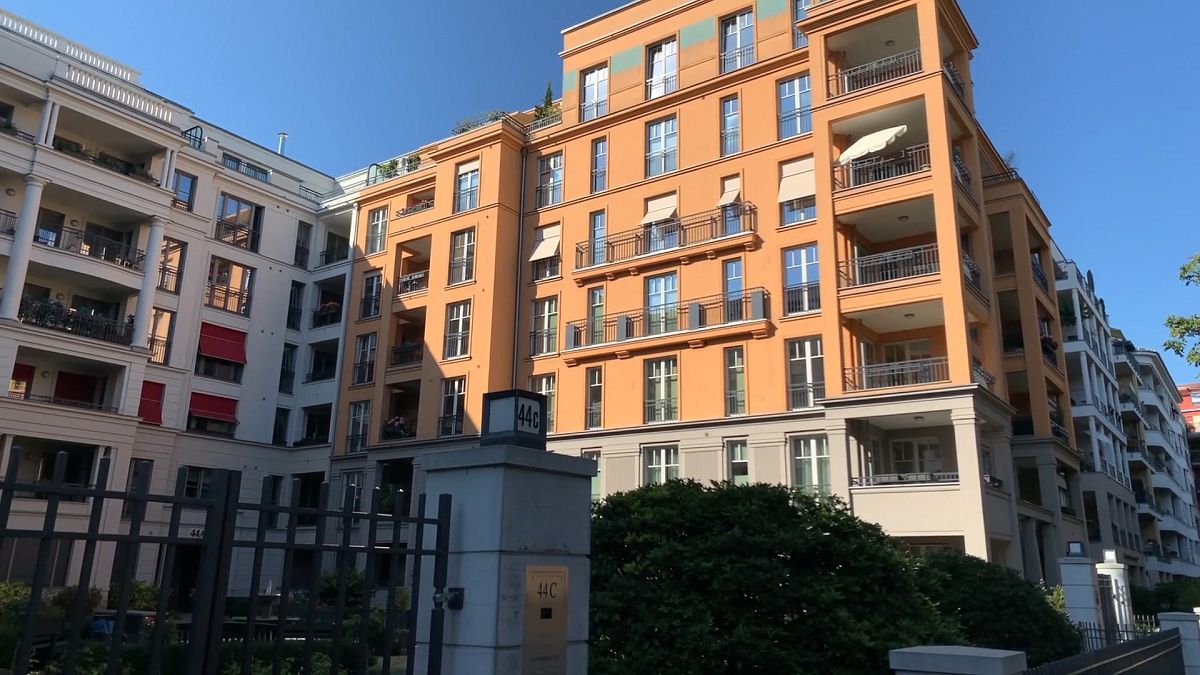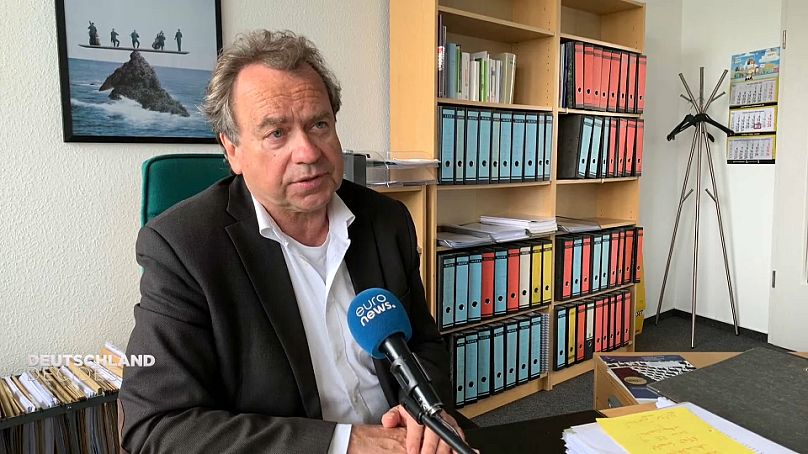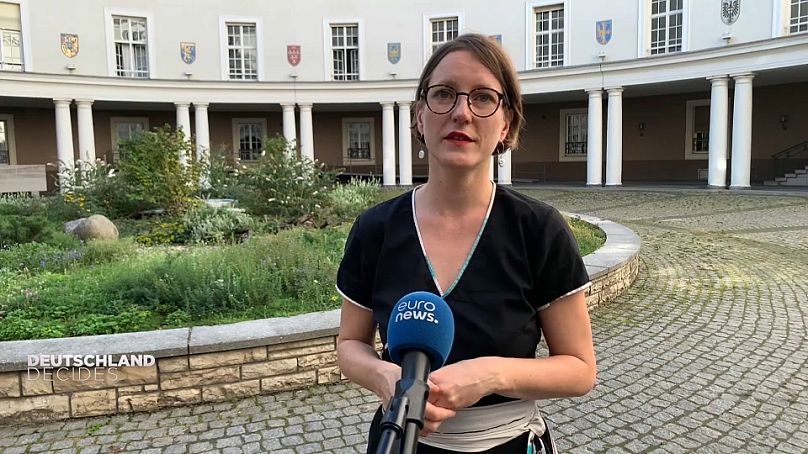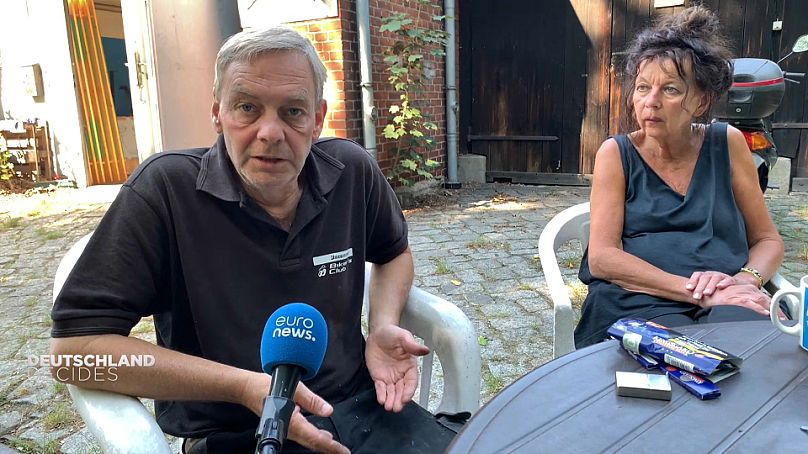Just weeks ahead of German federal elections, protesters took to the streets of Berlin to demand a nationwide rent freeze and the construction of new social and affordable housing. Berlin has been particularly hard hit by the lack of housing as its population has risen significantly in 10 years.
The German capital is bursting at the seams. More than 80 percent of Berlin’s 3.7 million residents rent their homes. But the city’s lure to investors, the structural lack of housing and the arrival of some 350,000 people in the last decade have sent rental prices skyrocketing.
At a demonstration in central Berlin, two weeks ahead of federal elections, protesters were demanding, among other things, a nationwide rent freeze and the construction of new social and affordable housing. One young demonstrator in her 20s told euronews that she thinks "it’s important that people can afford to live in Berlin and that people aren’t pushed out".
Other protesters reiterate this thought and another recurring argument heard at the demonstration includes the high cost of living and stagnant wages.
Rent cap thrown out
Berlin’s local government attempted last year to freeze rents for five years, with its "Mietendeckel" or rent cap. However, Germany's constitutional court ruled in April that the cap violated the constitution, saying that rent regulation lies in the hands of the federal government and not the regional state.
As rents continue to increase, the Berlin Renters' association says the growing gap between rich and poor is also being exacerbated on the housing market.
"Housing has now become a risk of poverty," says Rainer Wild, chief executive of the Berlin Renters Association. "The basic problem is that people aren't all on the same salary, but have very different incomes. And in the meantime, households with below-average incomes bear the burden of housing costs of 50% or more."
Berlin rents currently cost anywhere between 5.30 euros per square meter for pre-fabricated "Plattenbau" apartments to at least 13 euros per square meter from renovated pre-war buildings and luxury new builds.
Competition for apartments is also high. In January this year, an average of 214 Berliners were competing for one apartment. Long queues of would-be renters are still a common sight outside apartment blocks where viewings are taking place.
Expropriation referendum
But it’s the sale of thousands of state-owned apartments to corporate landlords in the late 90s and early 2000s that’s widely seen as one of the biggest contributing factors to Berlin’s housing crisis.
"This is a problem that, for several years, we’ve been trying to not only to stop, but also to counteract with the remunicipalisation of some of the property. We’ve clearly shown during this legislative period that this is possible," says Berlin State Secretary for housing, Wenke Christoph.
A deal in 2019 saw Berlin's state-owned housing company Gewobag buy back 6,000 Berlin apartments built as social housing between the 60s and 90s. The €920 million buy-back from Luxembourg real estate company Ado Properties was the biggest largest property renationalisation effort ever seen in the German capital.
But the initiative “Expropriate Deutsche Wohnen & Co.” (Deutsche Wohnen & Co. enteignen) wants to see more.
Earlier this year, the initiative collected 183,711 petition signatures – more than the required 172,000 – to hold a referendum on the possible expropriation. The petition calls for the expropriation of more than 240,000 homes which currently belong to major property companies – specifically those with more than 3,000 apartments in their portfolios.
"The proper legal term for what we’re trying to do is socialisation," says Joanna Kusiak, a research fellow in urban studies at the University of Cambridge, and "Expropriate Deutsche Wohnen & Co" activist.
"This means, indeed, that this property should be taken away from big corporations, but also that a new type of public institution should be created to manage this housing in a democratic way."
On September 26th, Berliners will have the chance to vote on the contentious referendum. While not legally binding, the hope is to put political pressure on Berlin.
In the meantime, new homes are being built – despite setbacks due to the slow processing of building permits, as well as the rise in costs of building materials. The city-state’s department for city development and housing calculated that some 200,000 new apartments needed to be built between 2017 and 2030 to meet the need for living space.
In the northwestern district of Berlin-Tegel, however, Heinz-Jürgen Korte and his neighbors are worried about the plans of investors who bought the land they live on to build pricey condominiums.
"We want to keep our bike workshop here. We want to preserve the site and, of course, we want to continue living here," says Korte. "That doesn’t mean that construction is not allowed here, Berlin needs flats. But we’re committed to community-oriented and social development for the property and development with sound judgement."
For now, the building plans on the land have ground to a halt. But residents are concerned about who will try next.
Nationwide problem
The lack of housing and rising rents is affecting German cities beyond the capital, with around 670,000 apartments lacking nationwide. Besides Berlin, major cities like Stuttgart, Munich, Frankfurt and Cologne have been particularly badly hit by the housing shortage.
As German voters head to the polls on September 26, it won’t be only Berliners who will have the guarantee of an affordable home on their minds.





